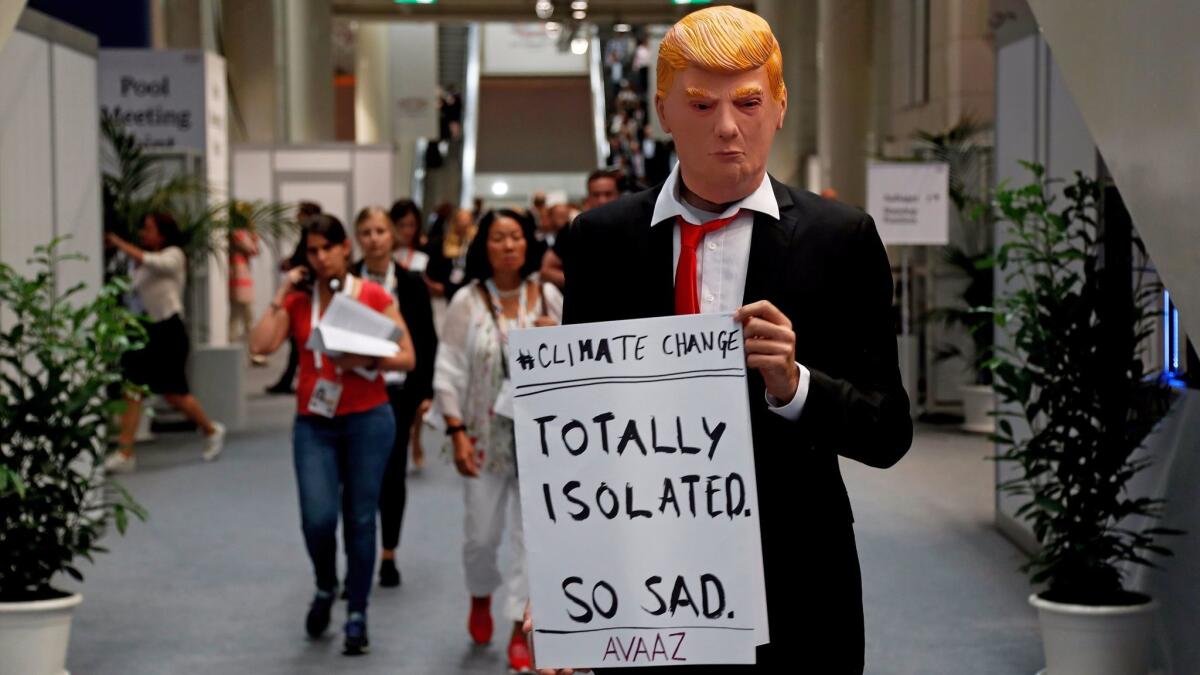Editorial: In leaking a federal climate change report, scientists send a message to Trump: Global warming is real

- Share via
A draft federal report on climate change that went public Monday contains little in the way of new science, and although its language is unequivocal, it merely confirms what has been obvious to so many scientists for so long: Human activity is increasing global temperatures, leading to potentially catastrophic climate change. So what’s the news? That federal scientists so feared the final report would be gutted or suppressed by the climate change-doubting Trump administration that they leaked it.
There’s no way to know for sure whether the administration would have squelched the final report, preliminary versions of which have been circulating for months. What we do know, however, is that President Trump’s refusal to accept the obvious about the planet’s changing climate is more than embarrassing. His stance sets the U.S. at odds with nearly every other nation on Earth, all but two of which are part of the 2015 Paris agreement to try to cap global warming to no more than 2 degrees Celsius over pre-industrial levels by significantly reducing greenhouse gas emissions.
Hitting the Paris agreement’s target will require a rapid pivot away from burning fossil fuels in favor of renewable energy. But Trump’s policy is to not only drill for more oil and gas and resurrect the coal industry (whose product is the worst offender among fossil fuels), but also to assert the U.S. as the dominant producer of the very energy sources that threaten radical upheaval in how humans live on Earth. That’s as wrong-headed as it is dangerous.
In leaking the report (obtained by the New York Times), scientists within the government ensured that their work would reach the public, serving as a check on the administration in case it did indeed try to trump science with politics. In that sense, the leaked report helps isolate the president, his fellow doubters and his allies, such as Environmental Protection Agency Director Scott Pruitt and Interior Secretary Ryan Zinke, whose combined regulatory moves would reduce curbs on emissions and set the stage for accelerated drilling and mining on federal lands. Additionally, environmental groups and states are mounting legal challenges to regulatory rollbacks that, we hope, will at the least slow these bad policies, if not stymie them altogether.
One area where the leaked report, part of the congressionally required quadrennial National Climate Assessment, breaks new ground is in so-called attribution science. In the past, scientists have been reticent to tie specific severe weather events to overall climate change. But the report says scientists are now able to draw some direct connections with varying degrees of certainty between climate change and such events as heat waves in Europe in 2003 and Australia in 2013. It also links human-propelled climate change with a decrease in the number of cool nights across the United States since the 1960s and an increase in the number of warm days since the 1980s.
“It is extremely likely that human influence has been the dominant cause of the observed warming since the mid-20th century,” the report says. “For the warming over the last century, there is no convincing alternative explanation supported by the extent of the observational evidence.”
Despite the head-in-the-sand denials among Republicans in Washington, in California the reality of climate change has found some bipartisan acceptance. The Legislature recently extended the state’s cap-and-trade program to reduce carbon emissions with the help of a handful of Republican lawmakers who believe the science of climate change. “We have to make decisions as legislators — do we do what is right or do we do what is politically right?” Assemblyman Devon Mathis (R-Visalia) said at the time. It’s a question more lawmakers ought to ask themselves.
The world is in a dangerous place, and it’s unclear how much of climate change even concerted global action can stop. The report adds to recent observations that temperatures at the poles are increasing more quickly than they are elsewhere, reducing the size of the Arctic ice cap which, some scientists believe, is creating a feedback loop in which less ice leads to warmer water temperatures which leads to less ice. And thawing tundra has also been emitting massive amounts of methane, causing more short-term warming than carbon dioxide and creating its own sort of feedback loop, leading to more thawing of the tundra.
The changes are already real and the future risks potentially catastrophic. The whole world knows it, and the vast majority of the world is trying to address it. That Trump is not, and that government scientists feel the needs to join “deep state” actors in leaking their findings in fear of what the president might do against the nation’s best interests, is damning.
Follow the Opinion section on Twitter @latimesopinion or Facebook
MORE EDITORIALS:
Trump tries diplomacy in countering North Korea’s nuclear provocation
Hard lines in court and at the border won’t fix our broken immigration system
Union-backed bill would tie counties’ hands on contract workers
UPDATES:
1:40 p.m.: This editorial was updated to clarify that preliminary versions of this draft final report have been available for months.
3 p.m.: The editorial was updated to separate Interior Secretary Ryan Zinke’s stance on climate change from EPA Director Scott Pruitt’s more skeptical position.
More to Read
A cure for the common opinion
Get thought-provoking perspectives with our weekly newsletter.
You may occasionally receive promotional content from the Los Angeles Times.









